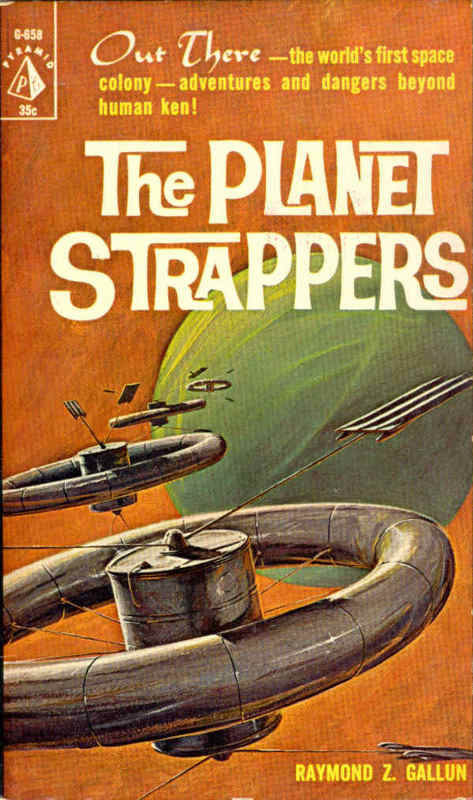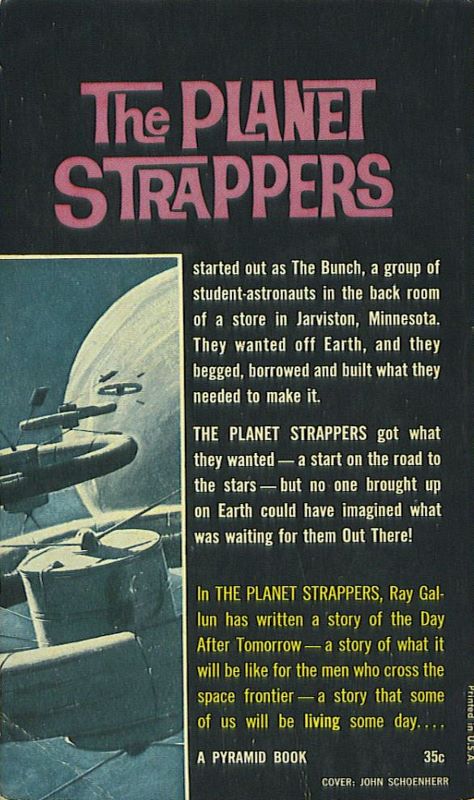
by Gideon Marcus
The nice thing about writing reviews for an immediately published medium, like a newspaper or a daily column, is the currency of the information you convey. Most reviewers get their books just before release from the publishers, and by the time their reviews are in print, their subjects are several months old. At Galactic Journey, you can be guaranteed a presentation of the very newest material.

Ironically, my offering for you this time around is Raymond Z. Gallun's The Planet Strappers, which while a brand new novel, reads like something written several decades ago. I'd gotten used to the out there stuff by Sturgeon and Farmer and Henderson, so it was a little jarring to find something so old-fashioned. But it makes sense: like the legendary "Doc" Smith, Gallun is a grizzled veteran of the 20s and 30s pulps. In fact, he hardly turned out a thing in the last decade.
Strappers is the story of The Bunch, a gang of young space enthusiasts from Jarviston, Minnesota who live some time in the mid-distance future. Their dream is to save enough dough to put together the kit needed to become space colonists: inflatable plastic habitats, "bubbs," that can be spun for gravity; ionic engines with weak but constant thrust, nuclear batteries; food, water, and air.
The Bunch are a diverse group. There's the Mexican, Miguel Ramos. The sole girl, Eileen Sands. The colored kid, Mitch Storey. The disabled fellow, "Gimp" Hines. The mathematically challenged "Two-and-two" Baines. To Gallun's credit, he does a good job of giving each of them character beyond their signature features. In fact, if there is any message of Strappers, it is that space is a level playing field, and that cultural distinctions are meaningless there.
Our viewpoint is Frank Nelsen, perhaps the smartest of The Bunch (and probably, though never specifically, a White man). We follow him through the creation of his colony kit and into space where he travels to most corners of the inner Solar System, encountering adventure, tragedy, and ultimately, happiness. It's a strange outline of a saga with a few fleshed out bits but with most being told in shorthand. Nelson's journey could easily have filled a book series (a la Danny Dunn or Lucky Starr). Instead, Gallun pares the tale down to its bare minimum.
As a result, rather than any of the sparsely portrayed players, the setting ends up being the real star of Strappers. We get a lot of technical exposition regarding the space-based economy as well as some solar-political background. The main polities seem to be The Free World and the statist Toves. The asteroids are a wild, woolly place constantly under threat by space-suited brigands. We are treated to loving descriptions of the "Archies," the ubiquitous space-suits that are practically single-person spaceships.
Gallun shows us a decidedly archaic view of the solar system with planets that don't conform with our latest scientific knowledge. For instance: Venus is uninhabitable, but not boiling. Mars' air is about a tenth as thick as Earth's (this may be true, but this assumes the existence of nitrogen in the Red Planet's atmosphere, which can't be directly detected). The Moon has a thin atmosphere, about 1/20,000th that of the Earth, as well as a few hardy plants clinging to volcanic vents. This is highly unlikely — virtually all sources I've consulted say that the Moon's atmosphere, such as there is, isn't much different from the hard vacuum of space.
Strappers features remainders of the Burroughsian belief that the outer planets were created earlier, cooled sooner, developed sentient life before ours. In fact, the asteroid belt, Gallun presents, was once the solar system's fifth planet before it was destroyed 60 million years ago in a war with the Martians. (The hoary idea that the Belt used to be a planet is probably impossible – all of the asteroids together barely make up a mass 1/20th of our Moon).
Despite the fanciful astronomy and the skeletal nature of the storytelling, I nevertheless got through Strappers, even enjoying it at times. There are genuinely interesting episodes that each could have made excellent novellas, particularly Nelsen's experience as a indentured archaeologist on the Moon's FarSide, his encounters with the sentient vegetables of Syrtis Major. I'd call the book a juvenile, but the subject matter isn't quite naive enough. I give the overall effort 2.5 stars.
Now if only someone would tell Gallun that "enormity" is not a synonym for "vastness"…

